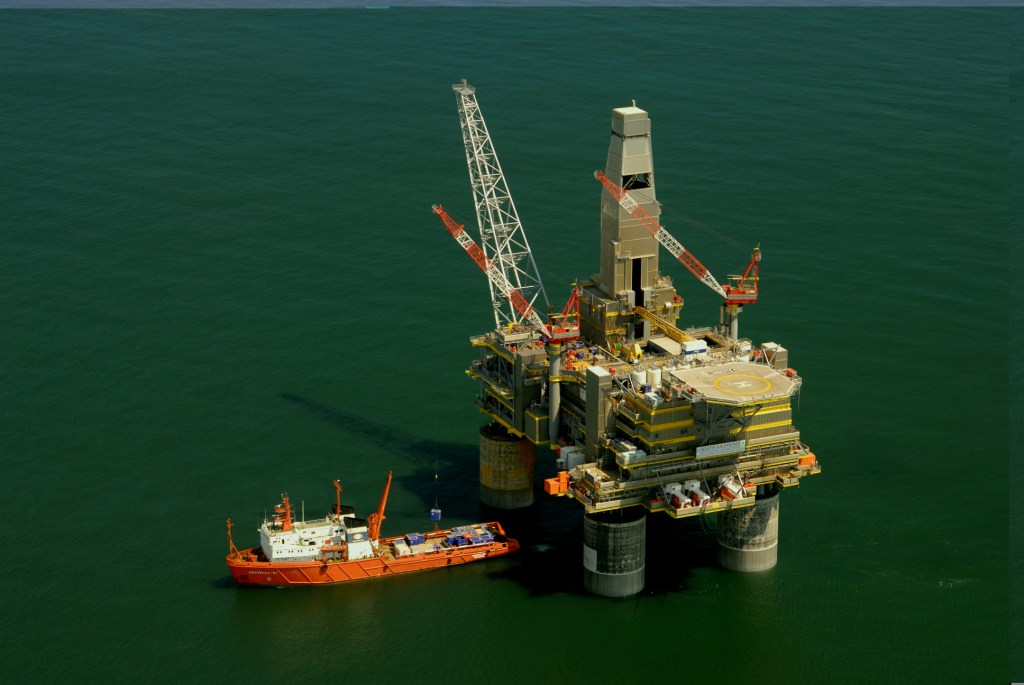Economy
Oil Sheds 2% Over Trade Deal Stagnancy as Brent Falls to $60

By Adedapo Adesanya
Oil prices continued to get the stick circumstances surrounding the US-China trade deal which has affected global oil demand over the past 16 months. As a result of this, major futures depreciated from gains gathered during last week sessions into the second day of the week.
By implication, Brent crude, the international benchmark which traded above $63 last week continued its fall further on Tuesday as it shed 2.34 percent or $1.46 to trade at $60. 98 per barrel. The US West Texas Intermediate crude lost 1.7 percent or 2.98 percent to settle at $55.44 per barrel.
Business Post had reported on Tuesday morning that a Chinese government source said that there was pessimism in China about prospects for a trade deal and the long-running dispute between the world’s largest economies has affected economic growth prospects.
This decline in prices of crude oil also occurred over concerns about excess global crude supply.
On the supply side, the Organization of the Petroleum Exporting Countries (OPEC) and its allies, including Russia, had earlier in the year agree to cut combined oil output by 1.2 million barrels per day that will run till March 2020.
However, sources show that Russia is unlikely to agree to deepen cuts in oil output at the December 5 – 6 meeting with fellow exporters in Vienna, but could commit to extend existing curbs to support Saudi Arabia, over worries about weak demand growth in 2020.
The prospect of a further increase in US crude inventories, suggesting ample supplies also led to the drop in prices of oil on Tuesday as this followed a rise in larger than expected rise in Norwegian oil production which also affected prices.
The American Petroleum Institute (API) is set to release its supply report at on Tuesday (yet to be released at press time) and the US government’s official figures are due to go public on Wednesday.
Oil may, however, trade lower or slightly higher on the outcome of this on Wednesday.
Economy
Financial Inclusion Drives Economic Growth—Smartcash CEO

By Dipo Olowookere
The chief executive of Smartcash Payment Service Bank (PSB), Mr Ayotunde Kuponiyi, has stressed the importance of financial inclusion to any nation’s economy.
Speaking with journalists in Lagos on Tuesday, he said the country will always experience economic growth when the majority of its citizens are financially included.
According to him, this is why the Central Bank of Nigeria (CBN) has intensified its efforts to drive financial inclusion in the country to about 80 per cent.
“Financial inclusion is important because when 80 per cent of your population is included financially, it then ensures growth in the economy,” he said at the unveiling of the nationwide marketing campaign of Smartcash titled No Be Cho Cho Cho.
“We have about 40 million or 50 million Small and Medium Enterprises (SMEs) in Nigeria, and a number of them don’t have bank accounts, but when they are included financially, they have access to finance, borrowing, and then grow their income.
“As the industry grows, they employ more hands (job creation), and when this happens, the government earns more revenue from taxes paid by the employed persons, which the government then uses to improve the standard of living of the citizens. Infrastructure will also be provided by the government. This is why financial inclusion is extremely important,” Mr Kuponiyi stated.
Commenting on the new campaign, the Smartcash boss said it reflects a broader philosophy of accountability in digital finance, with the zero-charge model, which eliminates fees on transfers and bill payments.
“Through our flagship zero-charge service, we promise no fees on P2P transfers or bill payments. Furthermore, our savings account offers 15 per cent per annum compounded interest, paid daily without penalties. Unlike conventional banks, we charge you nothing, ensuring your money truly works for you,” he averred, stressing that the zero-fee does not apply to the stamp duty charged by the federal government on transactions above N10,000.
He stated that the initiative centres on the three pillars of reliability, transparency and demonstrable service delivery and addresses what the company describes as a widening trust gap in Nigeria’s digital payments market.
Mr Kuponiyi also revealed that beyond consumer banking, the platform is also expanding its footprint through a nationwide network of agents that facilitate transactions and financial services in underserved communities.
Smartcash is the digital financial services platform of Airtel Nigeria, which is a subsidiary of Africa Plc, operating across 14 countries.
Economy
Oil at $85 Could Boost Nigeria’s External Balance Account—Bloomberg

By Adedapo Adesanya
Nigeria has been identified as one of the winners of an oil windfall following the US and Israel’s war on Iran.
According to Bloomberg Economics, the rise in prices will improve the current account balance of just three sub-Saharan African economies.
Bloomberg Economics’ Ms Yvonne Mhango wrote in a report on Thursday that if oil stays at about $85 a barrel, Angola, Nigeria and Ghana will see their current account balance improve, while the Democratic Republic of Congo, South Africa and Kenya will be among the worst-hit.
“For most African economies, higher oil prices mean weaker currencies and renewed inflationary pressure, which could put rate hikes back on the table,” she said.
According to the analyst, Nigeria, which is Africa’s largest oil producer, will not only gain from crude sales but from fuel exports.
Bloomberg Economics data showed that Nigeria’s current account balance could benefit by as much as 2.3 per cent of gross domestic product (GDP), second only to Angola’s 3.3 per cent and Ghana’s 0.2 per cent.
Already, the 650,000-barrel-a-day Dangote oil refinery has raised the prospect of sending more product to Europe if the price is right.
Dangote is offering up to 44,000 metric tons of jet fuel for loading March 20-22, as well as at least 40,000 tons of gasoil with a maximum sulphur content of 50 parts per million for loading March 15-30.
However, countries like Africa’s largest economy – South Africa – may face challenges if India and Oman, two of its biggest fuel suppliers, cut down on exports. It may see a -1.0 per cent hit to its current account balance.
South African consumers are bracing for fuel costs to increase in April, according to Central Energy Fund data, while traders moved to price in a chance of an interest-rate hike later this month.
Following US and Israeli strikes on Iran over the weekend and retaliatory moves by the Islamic Republic, global crude prices have adjusted sharply.
The Strait of Hormuz, a narrow shipping lane between Iran and Oman, through which roughly a fifth of global oil supply normally passes, has been blocked completely by Iran.
As of press time, Brent crude, which Nigeria prices its crudes is trading up at 2.3 per cent at $83.23. Nigerian crude grades, Brass River and Qua Iboe, are selling at $87 per barrel.
Economy
Nigeria’s Gold Holdings Rise to $3.5bn as CBN Diversifies Reserves

By Adedapo Adesanya
The Central Bank of Nigeria (CBN) said it has taken delivery of responsibly sourced gold refined to London Bullion Market Association (LBMA) Good Delivery standards into its foreign reserves, as part of its reserves diversification strategy.
The gold, sourced in Nigeria and aggregated by the Solid Minerals Development Fund (SMDF) through the National Gold Purchase Programme (NGPP), brings the CBN’s total gold holdings to $3.5 billion.
According to the CBN, the programme involves local miners and operates within a responsible sourcing framework aligned with the Organisation for Economic Co-operation and Development (OECD) Due Diligence Guidelines and the World Gold Council’s London Principles.
Speaking at the one-day Workshop on Strategies to Maximise the Economic Benefits of Minerals in Nigeria, the Governor of the apex bank, Mr Yemi Cardoso, disclosed that the lender acquired the monetary-grade gold in Naira at pricing linked to LBMA benchmarks, a structure designed to preserve Nigeria’s foreign exchange holdings while strengthening the nation’s gold reserves.
By purchasing domestically refined gold without deploying foreign currency, he said, the transaction enhances reserve accretion and supports broader macroeconomic stability objectives. Highlighting major shifts in global reserve management strategies, the CBN Governor noted their increasing importance amid rising global economic uncertainties.
He described the event as a reflection of Nigeria’s shared commitment to responsible and strategic management of its mineral resources. He emphasised that the workshop underscores the nation’s readiness to adapt to the realities of an evolving global economy, where resilience, diversification, and prudent governance have become increasingly vital.
He further explained that the session, convened by the CBN’s Corporate Secretariat and Reserve Management Departments, was designed to create a structured platform for engagement with key players in the gold sector and to deepen understanding of the industry’s current landscape, opportunities, and challenges across its value chain.
The governor noted that central banks around the world are prioritising economic resilience amid persistent geopolitical and market uncertainties.
He said gold has regained importance as a hedge against inflation and volatility, while other critical minerals are increasingly shaping global supply chains and advanced industrial development
Mr Cardoso emphasised that Nigeria’s immense natural and human resource potential can only be fully realised through prudence, strategic coordination, and long-term planning. He highlighted the need for strict adherence to internationally recognised standards, stressing that institutional credibility depends on strong governance frameworks.
On her part, the Executive Secretary of the Solid Minerals Development Fund (SMDF), Mrs Fatima Umaru Shinkafi, highlighted that the successful delivery of LBMA standard gold demonstrates the strength of the organisation’s formalisation framework and supply chain due diligence processes.
The World Gold Council’s Director of Central Banks and Public Policy, Ms Kurtulus Taskale Diamondopoulos, commended both the CBN and SMDF for designing the Nigerian Gold Purchase Programme (NGPP) in line with the twelve London Principles for responsible artisanal and small-scale gold sourcing.
She noted that the partnership between the CBN as sole off-taker and the SMDF as fiscal and supply chain manager offers a strong model for other countries seeking to strengthen similar programmes.
The President and CEO of the Africa Finance Corporation (AFC), Ms Samaila Zubairu, reaffirmed AFC’s commitment to financing and formalising Nigeria’s mineral sector, stressing the importance of accurate data and mineral processing infrastructure to attract investment, improve gold recovery, reduce environmental impact and support central bank purchases.
Also speaking, the Executive Vice Chairman of Kian Smith Gold Company, Ms Nere Emiko, underscored the urgent need for Nigeria to build strategic gold reserves and leverage commodity exchanges, noting the country’s low reserve levels relative to peers and calling for greater investment in exploration and transparency.
The Domestic Gold Purchase Programme forms part of the central bank’s broader strategy to enhance reserve quality, reduce external vulnerabilities, and position Nigeria’s mineral wealth as a pillar of long-term economic stability.
-

 Feature/OPED6 years ago
Feature/OPED6 years agoDavos was Different this year
-
Travel/Tourism10 years ago
Lagos Seals Western Lodge Hotel In Ikorodu
-

 Showbiz3 years ago
Showbiz3 years agoEstranged Lover Releases Videos of Empress Njamah Bathing
-

 Banking8 years ago
Banking8 years agoSort Codes of GTBank Branches in Nigeria
-

 Economy3 years ago
Economy3 years agoSubsidy Removal: CNG at N130 Per Litre Cheaper Than Petrol—IPMAN
-

 Banking3 years ago
Banking3 years agoSort Codes of UBA Branches in Nigeria
-

 Banking3 years ago
Banking3 years agoFirst Bank Announces Planned Downtime
-

 Sports3 years ago
Sports3 years agoHighest Paid Nigerian Footballer – How Much Do Nigerian Footballers Earn












